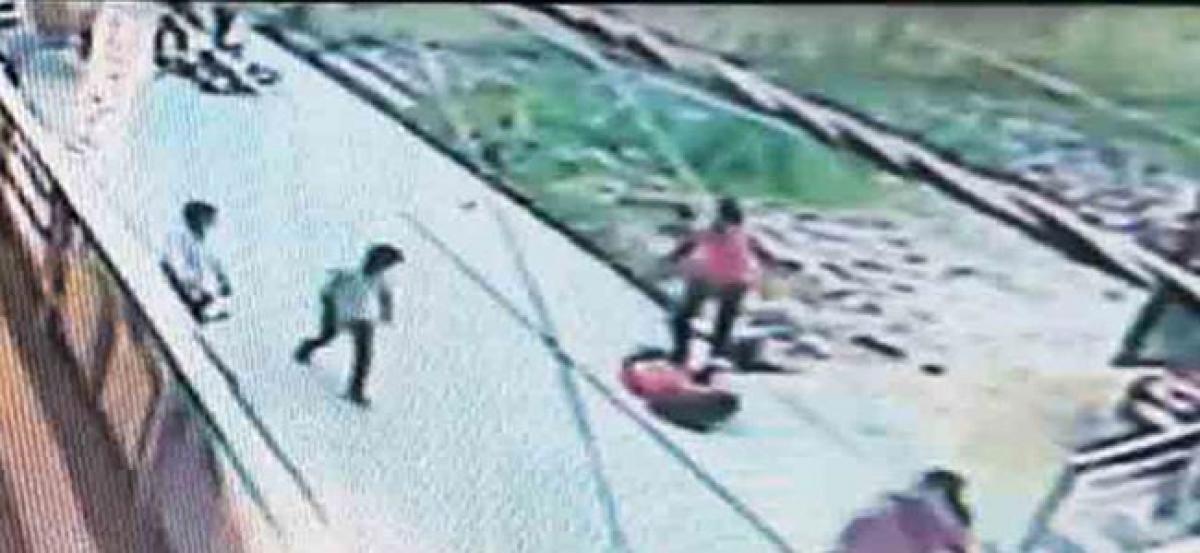Live
- ‘Get Set, Grow Summit 2024’ Focuses on Digital Detox for Families
- Stokes motivates his team to put in extra effort, says England pacer Potts
- From overcoming setbacks to leading India in U19 Women’s Asia Cup, Niki Prasad's amazing journey
- Constitution debate: PM Modi hails 'Nari Shakti'; makes strong pitch for 'United Bharat’
- Bihar: Inquiry initiated against principal who went to buy veggies during school hours
- TN: DMK postpones executive meet due to heavy rains & Parliament session
- Porous silicon oxide electrodes can fix durability issues in batteries: Researchers
- Jalandhar civic polls: AAP promises launch of 100 e-buses, round the clock water supply
- Economic upliftment of rural women is priority of Tripura govt: CM Saha
- Rajmata Jijabai Trophy: Manipur move to top of the table, T.N register first win
Just In

\"Looking at group mentality, when such acts happen in a crowd, no-one dares to act alone, since he\'s not sure whether others will come forward to help him or not. We call it diffusion of responsibility,\" Kamna Chhibber, Clinical Psychologist.
New Delhi, Sep 24: Earlier this week, Delhi's residents witnessed two completely different versions of crimes of passion. The suppressed rage of a spurned lover and a psychotic stalker spilled out into the streets and left everyone stupefied.
On Tuesday, a 34-year-old jilted lover, Sanjay Singh, stabbed a 21-year-old woman for an incredible 22 times in a rare act of brutality.
A day before, another woman, married and 32 years of age, was chased and knifed repeatedly near her house, by an ex-lover who had been stalking her for years.
Both died. And both cried for help as passersby who, either out of fear or indifference, chose to mind their own business and walked on or just stood and gaped.
The explanations for such apathy could be as varied as there are minds. But for reputed sociologist and clinical psychologist Ashis Nandy, it's proof of the increasing brutalisation of our society.
"We are getting more and more brutal. Very little is left in India in the way of culture and as a society, we are on our last legs," one of India's foremost public intellectuals, told IANS.
He cited large-scale cultural change as a reason for this societal breakdown -- in the process, sketching out the average Indian male these days.
"People these days are very, very manipulative, vile and calculative in their approach. This self-centeredness is the result of rapid cultural change and the change in education standards. Those days, when one would stick his neck out for his neighbor, are over," Nandi contended
"Our society is leading to anomie, or normlessness, in simple words," he added.
"If it was Calcutta (Kolkata) that man would've been lynched, people wouldn't have waited for police to come and no-one would say anything against such justice," he said, commenting on the passivity observed on the part of passersby in both the instances.
Some experts describe the phenomenon as a matter of survival and protecting oneself from harm.
S.K. Khandelwal, Professor and Head, Department of Psychiatry at All India Institute of Medical Sciences (AIIMS), explained: "People don't want to get into hassles. When you are met with such a situation, it either makes you aggressive or defensive. You either resort to violence yourself, or, if your very survival is at risk, you get into a defensive mode. We call it a fight or flight scenario."
"It can be a moral issue as well, I'm not denying that. But we all are selfish beings and it is wrong to put the blame squarely upon bystanders' shoulders for their apathy," he added.
Another expert had a different take on this.
"Looking at group mentality, when such acts happen in a crowd, no-one dares to act alone, since he's not sure whether others will come forward to help him or not. We call it diffusion of responsibility," Kamna Chhibber, Clinical Psychologist and Head of Mental Health Fortis La Femme told IANS.
"Another factor is the fear of retribution. One tends to think how interfering will impact him. If he fears a negative outcome like some harm or injury, then he will back out," she said.
She also listed the efficacy of an individual oneself in changing the outcome of the situation as one of the reasons for making or not making a move.
"People assess their ability before making a move. They think whether they are strong enough to overcome the opponent or whether they are trained enough to fight back... it's a combination of all these factors. We have no reason to think that it's only our society where people seldom interfere. It's a universal phenomenon," she explained.
There's another aspect of our, and possibly of any society, which needs to be considered.
As Surendra Nath Dubey, a retired professor and now the Editor-in-Chief of the Indian Journal of Community Psychology (IJCP), pointed out: "No-one wants to get into other people's matters; mainly out of fear of police harassment. We have seen it countless times, even in incidents of road-accidents, that no-one stops to help the victims. The attitude of police officers is a major cause in forcing people to become apathetic."
One thing is for sure: This is not the last one has heard of such incidents.
By Vishal Narayan
(Vishal Narayan can be contacted at [email protected])

© 2024 Hyderabad Media House Limited/The Hans India. All rights reserved. Powered by hocalwire.com







